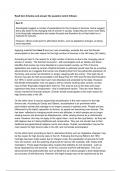Read Item D below and answer the question which follows:
Item D
Sociologists suggest a number of explanations for the increase in divorces. Some suggest
that a key factor is the changing role of women in society. Today they are much more likely
to be financially independent and career-focused and therefore do not feel reliant on a
husband for security.
However, others would point to alternative factors, such as legislative changes, as being
more important.
Applying material from Item D and your own knowledge, evaluate the view that female
emancipation is the main reason for the high number of divorces in the UK today (20 marks).
According to Item D, the reason for a high number of divorce is due to the ‘changing role of
women in society’. The feminist movement - with sociologists such as Oakley and Greer -
identifies that women are more liberated in a post-modern society, as 75% of divorce
applications are made by women. Radical feminists in particular would view this as a positive
advancement as it suggests that women are breaking free from the patriarchal oppression of
the family, and women are therefore no longer ‘sleeping with the enemy’. This high rate of
divorce may also be held accountable to the Equal Pay Act 1970 and the Sex Discrimination
Act 1975, in which women feel much more liberated and protected by the state. However,
this female emancipation may not apply to ethnic minority working class women, as they
may not feel ‘financially independent’ (Item D). This may be due to the class and racial
oppression they face in employment - due to institutional racism. They are more likely to
remain married for financial reasons. Overall, female emancipation is the main reason for
high divorce rates in the UK.
On the other hand, it may be argued that secularisation is the main reason for the high
divorce rate. According to Goody and Gibson, secularisation is so prominent within
post-modern society that marriage is no longer a sacred or spiritual union. People are less
influenced by the state’s opposition to divorce, as people are becoming more secular. This
has been reflected in changing social norms and attitudes, in which people are no longer
viewing divorce and divorcees as blasphemous, rather viewing divorce as a misfortunate
event. However, this may not apply to the upper class - such as the royal family - as they are
still religious due to it being traditional and conservative. They are not secular due to their
traditional and generational religious norms and values. Overall, secularisation may be the
main reason for high divorce rates in the UK, and not female emancipation.
On the other hand, according to Item D, alternative factors such as ‘legislative changes’ may
be the reason for high divorce rates in the UK. Following the Divorce Reform Act 1972,
marriage has been made easier due to cheaper costs, the equalisation of grounds for both
men and women, and the widening of grounds for divorce (for example, with ‘empty shell
marriages’). These legal changes allow couples that statistics do not represent - such as
those separated but not divorced - to file for a divorce and find self-liberation. This is an
advancement that postmodernists such as Beck like as it allows people to treat relationships
as a process of self-discovery. However, this legal change may not be experienced by the




